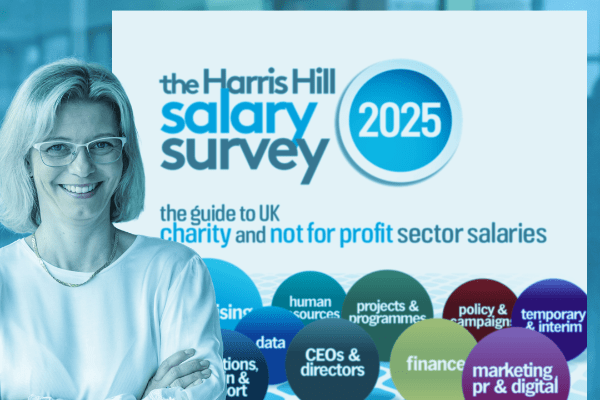Candidate scarcity and high inflation have made securing new staff more challenging (and expensive) than ever, but there ARE ways to improve your hiring prospects that needn't cost a thing...

Beyond the world of marketing, where they grow on carefully-branded trees, our latest Salary Survey finds candidates in short supply and high demand throughout the sector.
It’s the classic recipe for rising wages, but with charity sector pockets only so deep, what happens if there's no more money to throw at the problem? How can you attract the new staff you need to move forward?
Well, the good news is that while the general outlook might still seem bleaker than a week in Walford, there are (at least) three key steps you can take to maximise your chances of a successful hire, at no extra cost.
1. Be specific about the salary
‘Say what it is’ might seem to come straight from the insultingly-obvious school of advice, but being upfront and transparent really does make a difference.
Keen to maximise applications, many employers like to leave salaries open to interpretation, and if you happen to interpret more than is actually available, well, that’s on you. And often intentional.
Take a job advertised at £38-44k. In the minds of many candidates, that’s a £42k job at least, because with their skills and experience, of course they’ll be offered something towards the upper end. To the employer, it’s a £38k job they might just have to pay a little more for, in exceptional cases.
Meanwhile, the top end of £44k may be less a potential salary than simply a bid to attract high-calibre candidates at that level, hoping they’ll miraculously accept a lower rate once they get to know the organisation.
However [SPOILER ALERT]: they won’t. Not even for you. Which likely means repeating the process, with all the time, resources and cost that implies.
Ultimately, there’s no point attracting talent with salaries you’re not going to pay. Don’t say ‘circa £70k’ if the maximum offer will be £65k, or ‘£36-42k’ if Mother Teresa herself wouldn’t get more than £37k.
Overstating, exaggerating or giving a misleading impression of the salary might initially attract more eyeballs, but the real figure will have to be disclosed at some stage. If it's lower than candidates were led to believe, their trust will evaporate and the time (which, as we all know, is money) will be wasted, since someone who feels lured into applying under false pretences is never going to take the job.

Even if it's not particularly impressive, stating a specific salary has several advantages:
It becomes a known quantity, which can often win the day against an offer that claims to be higher, but has yet to be confirmed.
It says several good things about the organisation: that you're open and honest, that you respect and value applicants enough not to waste their time, that what you say can be trusted, and that the same salary applies regardless of who gets the job, suggesting a fair and equitable approach overall.
Those who apply will be doing so with their eyes open, fully aware of the pay, and having done their sums to make sure it's viable for them. As such, when you come to make an offer, there's a very good chance they'll accept, filling the vacancy at the first attempt. It's far more efficient and cost-effective than taking someone all the way through the interview process, only to lose them with a lower-than-expected offer and having to start again.

2. Be fast
If you can’t outbid the competition, outrun them: being quick off the mark is a real asset in this fast-moving market.
The key is to ensure candidates are never waiting too long without news. Acknowledge applications as they arrive and if interviews are some way off, an initial screening call can at least engage them in the process early on.
Online interviews save a lot of time, and in our experience, often yield better results as candidates are more relaxed in their own environment.
Either way, make swift decisions and share them promptly: at least half of today’s workforce have grown up in an on-demand, instant-feedback world where more than a week feels an impossibly archaic time to wait for anything.
Again, remember time is money: if protracted negotiations result in saving £3k on the salary, but the vacancy goes unfilled for another two months as a result, is it really a saving?

3. Be flexible
Flexibility: essential in a beanbag, and just as popular in the workplace, with flexible working being a major draw for the majority of candidates.
In the last few years, flexibility has grown from a fairly niche concern to challenging salary as candidates' number one requirement. So even if raising the salary isn't an option, offering greater flexibility may be just as effective.
And with studies and experience consistently showing there’s little downside to doing so, becoming applicants’ most flexible choice could be a smart way to make you their first.

Of course, in a cost-of-living crisis, there's no denying that the highest offer on the table will often win the day.
However, by making the salary a known quantity, moving fast and out-flexing the rest – probably not a word but go with it, we’re nearly there – you provide multiple grounds for candidates to consider your opportunity the better offer.

For more on salaries, hiring trends and current rates for more than 200 charity sector positions, check out the Harris Hill Salary Survey here, contact our specialist consultants, or give us a call on 020 7820 7300.

| |
-

Opportunity for all
Find out how we’re working to deliver more diverse, equitable and inclusive recruitment…
-

Recruiting a charity CEO?
Our executive recruitment specialists have an exceptional record of successful CEO, chair, trustee and…
-

Charity sector salaries
Our 2025 Salary Survey has the latest rates and expert insight for roles throughout the sector.













